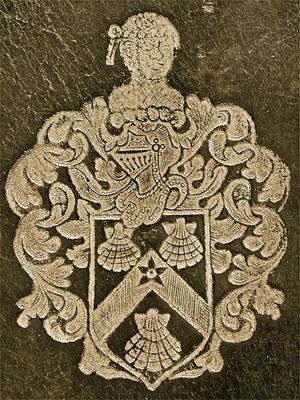Difference between revisions of "Edward Littleton 1589-1645"
m (Text replacement - "John Selden]]" to "John Selden 1584-1654|John Selden]]") |
|||
| (15 intermediate revisions by 3 users not shown) | |||
| Line 1: | Line 1: | ||
| − | ===[[name::Edward]] [[name::LITTLETON]], [[personal | + | __NOTITLE__ |
| + | ===[[name::Edward]] [[name::LITTLETON]], [[personal title::Baron Littleton]] [[date of birth::1589]]-[[date of death::1645]]=== | ||
| + | [[File:LittletonEdward1.jpg| thumb | Armorial stamp of Edward Littleton (British Armorial Bindings) ]] | ||
====Biographical Note==== | ====Biographical Note==== | ||
| − | Born at [[place of | + | Born at [[place of birth::Mounslow, Shropshire]], son of [[family::Sir Edward Littleton]], [[occupation::chief justice]] of [[location::North Wales]]. BA [[education::Christ Church, Oxford]] 1609; admitted to the [[organisations::Inner Temple]] 1609, called to the Bar 1617. [[occupation::MP]] for [[location::Bishop's Castle, Shropshire]] 1614, and for various other constituencies in the 1620s. [[occupation::Judge]] for the northern circuit 1623, [[occupation::recorder]] of [[location::Bridgnorth]] 1624, [[occupation::recorder]] of the [[location::City of London]] 1631. [[occupation::Solicitor-general]] 1634, knighted 1635, [[location::chief justice]] of the [[organisations::Court of Common Pleas]] 1640, [[occupation::Lord Keeper of the Great Seal]] 1641. Although he had a career of steady promotion in the legal establishment, Littleton is noted as having on numerous occasions sympathised with or supported parliamentary and individual freedoms against the royal position. |
====Books==== | ====Books==== | ||
| − | Littleton is noted as having been a learned [[occupation::lawyer]] with a comprehensive knowledge of European and | + | Littleton is noted as having been a learned [[occupation::lawyer]] with a comprehensive knowledge of European and English precedents, described by [[associates::Clarendon]] as "the best antiquary of the profession who gave himself to practice". Towards the end of his life he began working on a substantial legal treatise, intended for publication but left unfinished, which now partly survives in the original [[format::manuscript]] at [[present repository::Harvard Law Library]] (MS 2106). He was a close friend of [[associates::John Selden 1584-1654|John Selden]], whose library was one of the largest of his generation, and it seems likely that Littleton had an appreciable private library himself. Its size and fate are unknown but he is known to have used an armorial binding stamp, and a large engraved plate of his arms was sometimes used as a bookplate (only a few examples of either survive). ODNB notes that in the year after his death, his books and [[format::manuscript|manuscripts]] were ordered to be seized and given to [[subsequent owner::Bulstrode Whitelocke]], "but were evidently disbursed thereafter". His brief will has no mention of books, but directed that the residue of his estate be [[bequest::given]] to his [[beneficiary::brother]] [[family::Francis Littleton]]. Examples: NAL CLE PP8. |
====Sources==== | ====Sources==== | ||
<div id="sourcelist"> | <div id="sourcelist"> | ||
| + | *[https://discovery.nationalarchives.gov.uk/details/r/D863503 Will of Sir Edward Littleton, The National Archives PROB 11/210/37]. | ||
*[http://armorial.library.utoronto.ca/stamps/LIT003_s1 British Armorial Bindings]. | *[http://armorial.library.utoronto.ca/stamps/LIT003_s1 British Armorial Bindings]. | ||
*[http://www.historyofparliamentonline.org/volume/1604-1629/member/littleton-edward-ii-1590-1645 History of Parliament]. | *[http://www.historyofparliamentonline.org/volume/1604-1629/member/littleton-edward-ii-1590-1645 History of Parliament]. | ||
| − | *Brooks, Christopher W. "Littleton, Edward, Baron Littleton (1589–1645), judge and politician." Oxford Dictionary of National Biography. | + | *Brooks, Christopher W. [https://doi.org/10.1093/ref:odnb/16781 "Littleton, Edward, Baron Littleton (1589–1645), judge and politician."] ''Oxford Dictionary of National Biography''. |
*Lee, B. N. ''British bookplates'', 1979, 26-7; | *Lee, B. N. ''British bookplates'', 1979, 26-7; | ||
</div> | </div> | ||
| Line 21: | Line 24: | ||
[[Category:Libraries Seized]] | [[Category:Libraries Seized]] | ||
[[Category:Members of Parliament]] | [[Category:Members of Parliament]] | ||
| − | [[Category:Bookplates]] | + | [[Category:Bookplates and Labels]] |
| + | [[Category:All Owners]] | ||
Latest revision as of 07:18, 27 March 2022
Edward LITTLETON, Baron Littleton 1589-1645
Biographical Note
Born at Mounslow, Shropshire, son of Sir Edward Littleton, chief justice of North Wales. BA Christ Church, Oxford 1609; admitted to the Inner Temple 1609, called to the Bar 1617. MP for Bishop's Castle, Shropshire 1614, and for various other constituencies in the 1620s. Judge for the northern circuit 1623, recorder of Bridgnorth 1624, recorder of the City of London 1631. Solicitor-general 1634, knighted 1635, chief justice of the Court of Common Pleas 1640, Lord Keeper of the Great Seal 1641. Although he had a career of steady promotion in the legal establishment, Littleton is noted as having on numerous occasions sympathised with or supported parliamentary and individual freedoms against the royal position.
Books
Littleton is noted as having been a learned lawyer with a comprehensive knowledge of European and English precedents, described by Clarendon as "the best antiquary of the profession who gave himself to practice". Towards the end of his life he began working on a substantial legal treatise, intended for publication but left unfinished, which now partly survives in the original manuscript at Harvard Law Library (MS 2106). He was a close friend of John Selden, whose library was one of the largest of his generation, and it seems likely that Littleton had an appreciable private library himself. Its size and fate are unknown but he is known to have used an armorial binding stamp, and a large engraved plate of his arms was sometimes used as a bookplate (only a few examples of either survive). ODNB notes that in the year after his death, his books and manuscripts were ordered to be seized and given to Bulstrode Whitelocke, "but were evidently disbursed thereafter". His brief will has no mention of books, but directed that the residue of his estate be given to his brother Francis Littleton. Examples: NAL CLE PP8.
Sources
- Will of Sir Edward Littleton, The National Archives PROB 11/210/37.
- British Armorial Bindings.
- History of Parliament.
- Brooks, Christopher W. "Littleton, Edward, Baron Littleton (1589–1645), judge and politician." Oxford Dictionary of National Biography.
- Lee, B. N. British bookplates, 1979, 26-7;
